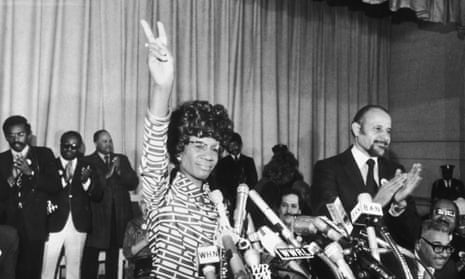Hundreds of positive stories of black women and their successes were shared on Twitter on Friday, using the hashtag #BlackWomenDidThat. The campaign aimed to celebrate women who were the first in their field or were less acknowledged for their work.
The hashtag started after Anthony J Williams, editor-in-chief of the Afrikan Black Coalition, put out a call “to commemorate black women who impacted your life”. A Twitter user with the handle Bitterblue55 responded, suggesting #BlackWomenDidThat.
The original idea, Williams wrote, was to commemorate black women who ran for office before Hillary Clinton, who on Thursday night became the first woman to accept the presidential nomination of a major party. He began with Shirley Chisholm, the first black woman elected to Congress and the first to run for president; Angela Davis, an educator, activist and two-time vice-presidential candidate for the Communistparty; and Monica Moorehead, who is currently running for president with the Workers World party.
Claudette Colvin was one of many names subsequently mentioned. In March 1955, as a teenager living in Montgomery, Alabama, she refused to give up her seat on a segregated bus. Rosa Parks did the same in December of that year. In 2014, Colvin told NPR the civil rights movement chose Parks as a symbol over herself.
“I knew why they chose Rosa,” she said. “They thought I would be too militant for them. They wanted someone mild and genteel like Rosa.”
#ClaudetteColvin at age 15 was arrested for refusing to give up her seat on a bus - B4 Rosa did #BlackWomenDidThat pic.twitter.com/S7ixlhDKpb
— #TroilusCresibo (@LeslieMac) July 29, 2016
Jackie Ormes was the first black woman to have a career as a cartoonist. According to the New York Times, her comics were syndicated in the Pittsburgh Courier’s Sunday comics supplement from the 1930s to 1950s. Ormes was also a political activist who lived much of her life in Chicago.
Jackie Ormes. First Black Woman Cartoonist. Creator of Torchy Brown and Patty-Jo 'n' Ginger. #BlackWomenDidThat pic.twitter.com/zMNCQ5VmG4
— Chelsea: Dora Milaje (@IfIWereMagneto) July 29, 2016
The writer Gwendolyn Brooks was the first black person to win a Pulitzer Prize, in 1950, for her second poetry collection, Annie Allen, about a black girl growing up in Chicago. Born in 1917, Brooks began writing at an early age and wrote more than 20 books of poetry and prose. In 1968, she became the poet laureate of Illinois. She died in 2000.
Gwendolyn Brooks is the first African American to win the Pulitzer Prize for Literature.#BlackWomenDidThat pic.twitter.com/fsPD78Xb9h
— ♐Skin of Becky♐ (@IKilledBecky) July 29, 2016
Dr Mae Jemison served for six years as a Nasa astronaut, the first black woman to go to space. In 1992, she was a science mission specialist and a co-investigator of a bone cell research experiment on the space shuttle Endeavor.
Jemison received her bachelor’s degree in chemical engineering from Stanford and her MD from Cornell. She has worked as a physician, engineer, educator and entrepreneur. She now serves as the principal for 100 Starship, an organization which hopes to “make the capability of human travel beyond our solar system a reality within the next 100 years”.
Dr.Mae Carol Jemison, the first African American woman to travel in space. #BlackWomenDidThat pic.twitter.com/aUe9237Mrc
— ☜═㋡ J!M (◣﹏◢) (@_JMOxQ) July 29, 2016
The stories of hundreds of women were shared using the hashtag. Many acknowledged women in their own lives, such as a mother who completed law school after putting it off for her children.
April Reign, the woman who created #OscarsSoWhite, recommended her followers “immerse yourself in the hashtag. Retweet until your thumbs fall off. We’re simply amazing.”
“I’m learning more from Twitter than all 12 years of public school #BlackWomenDidThat,” one user wrote.
I feel empowered reading all of these groundbreaking things our Black Women did! We gotta pass on to our daughters #BlackWomenDidThat
— Malika (@_Malikalovess) July 29, 2016
The response to the hashtag was generally positive, but Twitter being Twitter, there was some negativity. The comedian and CNN host W Kamau Bell said a “hidden benefit” to the campaign was that it was “also a quick & easy way to find that someone is a racist” – he included a screenshot of an offensive tweet.
In a manner similar to the backlash towards the #BlackLivesMatter campaign, some critics felt the hashtag excluded white women.

Comments (…)
Sign in or create your Guardian account to join the discussion